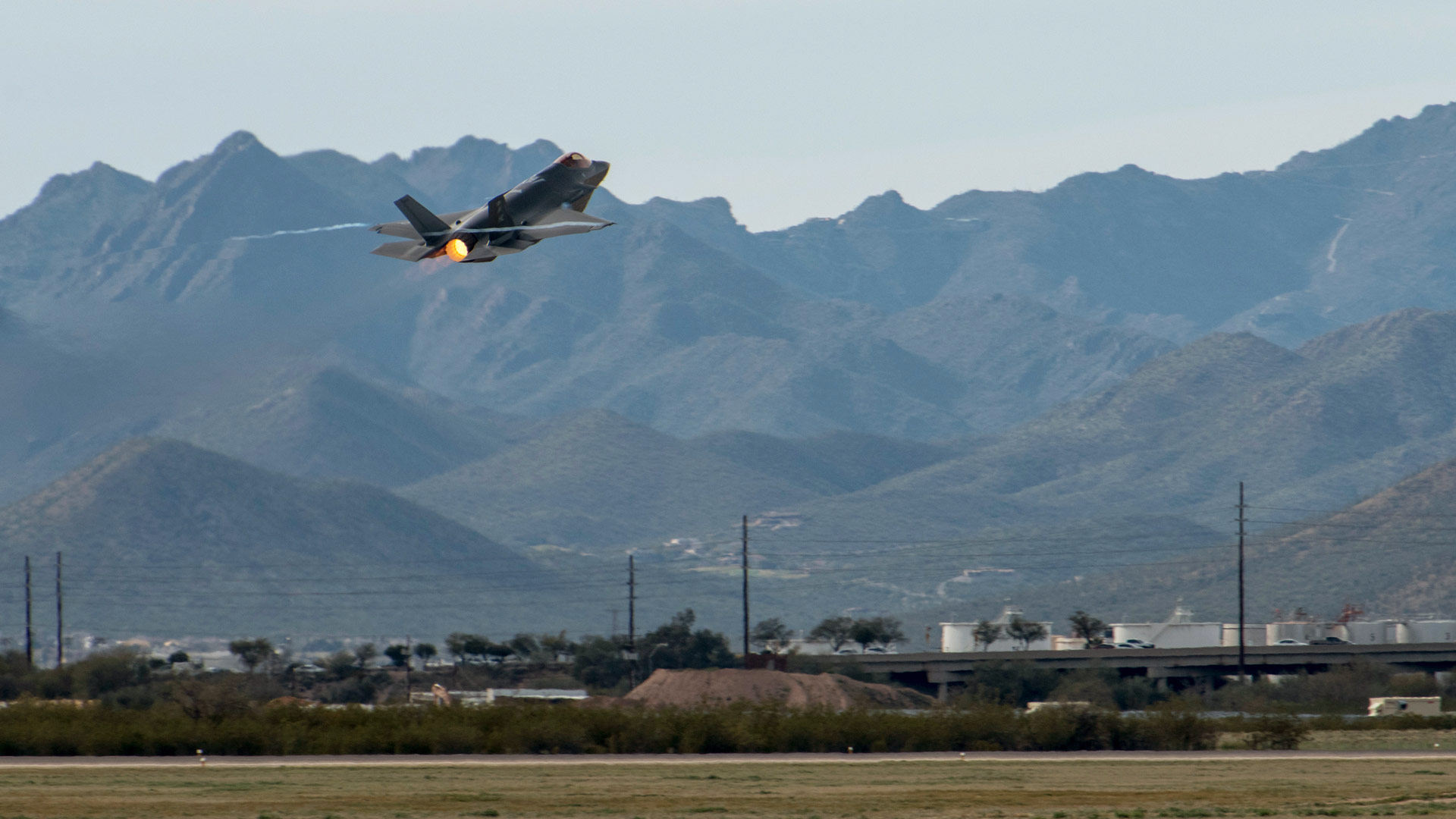 An F-35A takes off from Davis-Monthan Air Force base in Tucson during the annual Heritage Flight Training course, Feb. 27, 2020.
An F-35A takes off from Davis-Monthan Air Force base in Tucson during the annual Heritage Flight Training course, Feb. 27, 2020.
Pentagon spending in Arizona fell sharply in fiscal 2021, part of an overall decline in expenditures nationally that bumped the state from seventh place among states to 13th, according to Defense Department data released this fall.
Military spending overall in the state fell from $20.2 billion in fiscal 2020 to $14.6 billion in fiscal 2021. That was a sharper drop than the 5.6% decline in spending nationwide during the same period when combined spending on contracts and military personnel fell from $593.9 billion to $559 billion.
But analysts said that while Arizona may have slipped in its standing among states, the drop is not cause for concern. The defense industry remains a pillar of the state’s economy. they said, and will likely continue to be so for the foreseeable future.
“In terms of a good environment and a welcoming environment, Arizona is positioned very well to continue that growth in this industry,” said Todd Sanders, president, and CEO of the Greater Phoenix Area Chamber of Commerce.
The Pentagon spent $398.7 billion nationally on contracts in fiscal 2021 – a drop from $439.4 billion a year before – but that was partially offset by an increase in spending on personnel employed by the Defense Department, which went from $154.6 billion to $160.3 billion in the same period.
Pima County, home to Davis-Monthan Air Force Base near Tucson, saw spending on military salaries and benefits grow from $746 million in fiscal 2020 to $764.6 million a year later. Michael Guymon, president and CEO of the Tucson Chamber of Commerce, said that personnel spending “demonstrates that the Department of Defense is still very committed to Davis-Monthan and the missions that come out of Davis-Monthan.”
Guymon also praised the “great talent” that comes out of the University of Arizona’s engineering department, which he said helps contribute to Tucson’s robust defense economy.
Military contracts have long been a staple of the Arizona economy, which includes multinational defense manufacturers such as Boeing, Raytheon, and Northrop Grumman, among others. But contract spending took a hit in fiscal 2021 both nationally and in Arizona, with contracts in the state falling from $15.7 billion to $12.3 billion, according to the Pentagon report for 2021.
Boeing saw its contracts in Arizona fall from $2.2 billion to $1.2 billion over the year. But Kathleen Jolivette, vice president of Boeing Mesa’s attack helicopter program, said in a prepared statement that she looks forward to the future, noting the “solid and stable defense demand” in the U.S.
Jolivette said Boeing in Arizona has been focused on delivering a continued supply of Apache helicopters, working to deliver “the best capability to the warfighter today while innovating for the future.” Despite the Army lowering its orders for Apache helicopters from 49 in fiscal 2021 to 30 in fiscal 2022, Jolivette said that “strong international sales make up the gaps.”
“Our portfolio is well positioned and our future franchise programs have a long runway ahead,” Jolivette said.
The fiscal 2021 numbers nationwide do not reflect billions in spending this year on military assistance to Ukraine in its war with Russia. The state rankings were also skewed by “large contracts to Pfizer, Inc. and Regeneron Pharmaceuticals, Inc. in New York” and to “Moderna, Inc. in Massachusetts” to acquire COVID-19 vaccines, the Pentagon report said.
“The contracts in New York and Massachusetts were related to COVID-19 vaccine and treatment purchases by DoD, in coordination with the U.S. Department of Health and Human Services,” the report read.
The Pentagon also said that while eight of the 10 companies on its list of the top 10 contractors had been there before, Pfizer and Moderna “were both new to the list and are anomalies for traditional defense spending.”
Over the past decade, Arizona has been as low as 13th among states for defense spending – in fiscal years 2016, 2017, and now 2021 – and as high as seventh place in fiscal 2020.
“Clearly, this spending is important for Arizona,” Sanders said. “We looked at the stats for 2021 and as you look at the rest of the economy, you saw a similar drop in revenues or spending with the rest of the economy as a result of COVID.”
Sanders said the slowdown in defense spending was a “delayed effect of the economic slowdown from COVID.”
But he expects the slowdown is just temporary and reiterated the importance of defense to Arizona, where the Arizona Commerce Authority says 56,500 workers are employed in aerospace or defense jobs.
Similarly, Guymon said the defense industry in Tucson is a good one to bet on. And, he said, it’s not just the heavy hitters like “Raytheon and Davis-Monthan.”
“It’s also the 200-plus other companies in the aerospace and defense industry here in southern Arizona,” Guymon said. “From a purely economic development standpoint, Tucson and southern Arizona have the fifth-highest concentration of aerospace and defense employees in the country.”

By submitting your comments, you hereby give AZPM the right to post your comments and potentially use them in any other form of media operated by this institution.